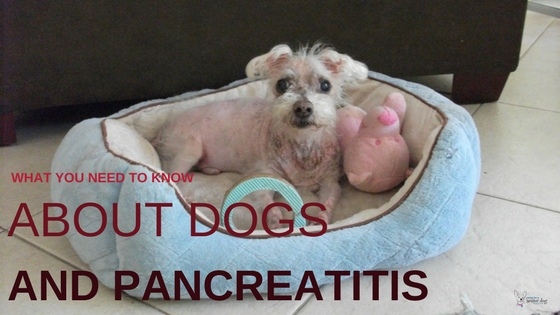
The most important thing you need to know about dogs and pancreatitis is, they could die if left untreated.
My dog Bailey died, not because he wasn’t treated but because he was in the “care” of incompetents who decided feeding him a can of dog food after being at their clinic just one day was a good idea. Actually that sounds like “untreated” to me. I had no previous experience caring for a dog with pancreatitis, so blindly trusted they would help him.
I would hate for you to have to experience this kind of loss because of something that is almost always treatable. Knowledge is power, to quote a cliché, and this article will give you all you need to ensure your dog has a better outcome than mine.
What function does the pancreas serve?
The pancreas produces and secretes digestive enzymes which, as the name suggests, is essential for food digestion. It also produces insulin which helps control metabolism and regulate blood sugar levels. The digestive enzymes  usually lie dormant until they reach the small intestine where they start doing their job. However if they are activated prematurely, before they reach their destination, they cause the pancreas to digest itself.
usually lie dormant until they reach the small intestine where they start doing their job. However if they are activated prematurely, before they reach their destination, they cause the pancreas to digest itself.
What is pancreatitis?
Simply put pancreatitis is an inflammation of the pancreas, and it is painful. Not only that but it can progress quite rapidly, to the point where it is no longer possible to treat.
There are two types – acute and chronic.
Acute
Acute means it comes on suddenly and lasts for a short period of time. It can be nothing more than mild discomfort or full blown life threatening. It typically happens around the holidays (but not exclusively) when we’re eating tons of high fat food and the dog gets his fair share of table scraps. It can also happen when he’s out walking and picks up something he shouldn’t.
Chronic
Chronic means ongoing and is often a result of having a bout of acute pancreatitis. This too can range from mild discomfort to deadly serious.
Signs of pancreatitis in dogs
- Loss of appetite
 Vomiting/projectile vomiting
Vomiting/projectile vomiting- Difficulty breathing
- Stomach ache
- Diarrhea
- Lethargy
- Dehydration
- Fever
- Swollen abdomen
- Elevated heart rate
- Restlessness
- Hunched posture
The most common signs are loss of appetite, vomiting, and abdominal pain. Signs for both acute and chronic pancreatitis are similar so don’t try and guess which one your dog has.
A good rule of thumb to follow and one I talk about a lot is – If you notice any changes in your dog’s behaviour, even if it seems slight, call your vet. If they brush you off but you know there’s something wrong insist on an appointment. You know your dog best and treating something early can mean the difference between life and death, and that is certainly the case with pancreatitis.
My experience with dogs and pancreatitis
I tell this story years later with a lot more experience under my belt, and without the naïve belief that vets have all the answers.
The first experience I ever had with pancreatitis was with my dog Bailey. He was old, no idea how old, and a foster we never gave back. Foster failure anyone!! Sadly this condition struck after we had moved to a new city, and hadn’t yet found the amazing vet I have now. I know this would have had a happy ending if we had.
Long story short, he started throwing up so I took him to a practice recommended by a neighbour. They said he had pancreatitis and kept him in overnight on fluids. After one day they fed him a can of chicken dog food and  sent him home. He started throwing up not long after, and when I called to tell them, they assured me he was fine when he left. There are vets who believe a dog needs 3 days on fluids, they believed 1 was enough.
sent him home. He started throwing up not long after, and when I called to tell them, they assured me he was fine when he left. There are vets who believe a dog needs 3 days on fluids, they believed 1 was enough.
After a torturous night of him being in pain (yes he had medication) and me watching the seconds tick by, I took him to see the vet in our old city, and he immediately admitted him for 3 days of fluids. Unfortunately by that time his pancreatitis was too severe to save him.
I lodged a formal complaint with the veterinary governing body, even though they told me it’s unlikely I would win. They all stick together don’t they, even at the cost of a life. I didn’t win and was forced to pay the vet bill. Imagine how that felt!
That experience made me even more determined to demand the best care for my animals, and to learn as much as possible about every condition so I stay on top of all treatment. I’ve always taken vet care seriously, and done the best I could to find great professionals, but sometimes it takes a serious illness to show how skilful, or not, someone truly is.
Which brings me to my current situation with the love of my life Red
Red has had a few bouts of pancreatitis, the first attack coming after eating coconut oil. I started adding it to her diet because I had read it could possibly help with dementia, which see suffers from. Of course I consulted my vet first and even gave her half the recommended dose. I’ve learned when the diarrhea starts it’s time to leap into action, no hanging around to see if it clears up on its own. It can be so dangerous in old dogs I won’t take a chance.
This past November she was slammed with a very bad case, and despite fluids and medications she showed no sign of improving after 2 ½ weeks. All she did was sleep, and a few times a day I would wake her so she could eat (which she barely managed), pee and poop. That is not the life I wanted for her so I made the decision to let her go. Wouldn’t you know the next morning when we were about to leave to the vet’s office she perked up!
What caused that horrendous episode?
I was shocked when I realised the same food she’d been eating for a long time, was the very thing that caused it!
Red has been eating k/d for at least a couple of years, but for a period of several months I switched her to a home cooked diet created by my holistic vet. I eventually went back to her prescription food (it’s a long story!!), incorporating her home made food into it.
 When my k/d order was cancelled the morning it was to be delivered, and a new batch not being available for 3 days, she had to rely exclusively on her homemade food again. After a couple of k/d meals she got diarrhea and things went from bad to worse. I assumed it was a bad batch because she had never been affected by it before, so I sent it back and ordered it elsewhere.
When my k/d order was cancelled the morning it was to be delivered, and a new batch not being available for 3 days, she had to rely exclusively on her homemade food again. After a couple of k/d meals she got diarrhea and things went from bad to worse. I assumed it was a bad batch because she had never been affected by it before, so I sent it back and ordered it elsewhere.
It turns out that although her kidney diet doesn’t contain much fat, being off it for just 3 days was enough to cause an attack. I know to slowly introduce a new food to a dog, but this wasn’t new!
So what was she going to eat?
I am dealing with a dog with several conditions, two of which are kidney insufficiency and pancreatitis. My vet told me the diet for one is not good for the other so I decided it was more important to feed her for pancreatitis.
I was given a can of Hills Prescription Digestive Care i/d (low fat) to try after another recent bout about a month ago, and to my delight she loved it. I am sticking with it and I add boiled chicken breast, quinoa, whole grain rice, peas, squash, carrot and some broccoli for interest and added benefits.
Red’s treatment protocol
When she has an attack there’s always at least 1 day at the vet’s on fluids, sometimes 2 but she never stays overnight.
She is prescribed –
- Rinitidine .5 ml 2x day 7 days (a histamine blocker to treat stomach issues, soothe inflammation)
- Metrobactin
- Imodium 1.7 ml 2x day max of 2 days
- Nutritional support
- Royal Canin Rehydration support powder mixed in with about 1 ½ pints of water
- Pain relief at the vet
Her normal routine is her diet, medications for her other issues as well as –
½ capsule of Pro Enzorb twice a day
½ sachet of Pro-Kolin Enterogenic per day (both of which help with digestion)
Rehydration support mixed in a 700ml bottle – it’s perfectly safe for your other dogs to drink as well
Causes
The exact cause of your dog’s pancreatitis may not be known (idiopathic), but there are several known causes that include but are not limited to:
A side effect of certain medication including Prednisone, anti-seizure drugs such as Potassium Bromide or Phenobarbital
 Eating fatty/greasy foods (like when people slip their dogs food at holiday time)
Eating fatty/greasy foods (like when people slip their dogs food at holiday time)
Regular diet high in fat
Eating from the garbage
Found something on the street or in the park during his walk
Hypothyroidism
High levels of fat in the blood (lipemia)
Cushing’s Disease
Trauma to the pancreas/hit by a car…conditions that may affect blood flow at the thoracic-lumbar junction, the region that supplies blood to the stomach and pancreas. That weakens the pancreas and increases the chances of pancreatitis
Abdominal surgery
Older dogs
Overweight dogs
Diabetes mellitus
Genetics
Dry food/ processed foods/high carbs mostly grains
An interesting fact
Just because your dog is on a low fat diet, doesn’t mean he can’t develop pancreatitis. Simply eating a large amount of fatty food at one time can cause acute pancreatitis, which is why it’s so important to watch what your dog eats and discourage family and friends from sneaking him table scraps.
How to diagnose pancreatitis
Your vet can get a pretty good indication of whether or not there is a possibility of pancreatitis based on what you tell him about your dog’s condition and symptoms.
Because Red has chronic pancreatitis, she is treated right away because we know what it is. A blood test is done, if I want, to confirm whether the pancreas is affected although that particular test cannot tell you to what extent.
The steps your vet will take to make a diagnosis may depend on the vet. What do I mean by that? I used to go to an animal hospital in Florida where the staff would always order the most expensive and invasive tests first. Other  vets prefer to start simple and depending on what, if anything those initial tests reveal, more complex tests would be needed.
vets prefer to start simple and depending on what, if anything those initial tests reveal, more complex tests would be needed.
Your vet will typically start with blood and urine tests as many can be done in house with relatively quick results. Depending on what he finds, or doesn’t find in some cases, x rays and/or an ultrasound may be needed.
It is possible your vet may wish to repeat some of the tests at a later date to monitor your dog’s recovery.
Treatment
Whether the cause is known or not, your vet’s primary focus will be on keeping your dog comfortable, free of pain and hydrated.
I discussed my vet’s treatment protocol for Red, but things may differ in your dog’s case.
Treatment is based on dealing with dehydration and restoring electrolyte balances through IV and fluid therapy, controlling other symptoms such as nausea, diarrhea and pain with medications, and providing nutritional support.
If pancreatitis is due to a side effect of medication, your vet will discontinue the medication immediately.
At home
You will be given medications to administer at home over the course of a week or two depending on what’s needed. You may be given antibiotics, anti-nausea medications and a nutritional support paste until your dog is back to eating normally.
Some rehydration support may also be recommended for a few days.
A low fat, bland diet will be prescribed, the length of time to be determined by your vet, depending on your dog’s condition. It may be just until he recovers, or a permanent move.
If you follow a more natural or holistic diet and the recommended one is not, voice your concerns, learn what ingredients should be avoided and why. Bring the packaging of the food you prefer, to see if it’s suitable.
Will your dog need to be hospitalised?
It depends on how severe the pancreatitis is and your dog’s overall health. A few hours of fluids at the practice may be enough, while some dogs may need 3 days. If the practice does not have overnight staff, or you know your dog will not do well being left alone, it is possible you may be allowed to bring him home overnight and go back in the morning. Your vet will discuss your options with you.
Prognosis for recovery
Pancreatitis can be unpredictable, and the prognosis for recovery can depend on a variety of factors, the number one being how quickly it is diagnosed and treated. Dogs can usually recover from mild cases. Even those whose  cases haven’t been caught quickly have a chance for a good outcome, but a lot will depend on the experience of the vet and the treatment plan prescribed.
cases haven’t been caught quickly have a chance for a good outcome, but a lot will depend on the experience of the vet and the treatment plan prescribed.
Managing pancreatitis
It’s great to know the condition can be managed, and your dog can lead a normal life. However it does require vigilance and cooperation from other household members.
Pancreatitis is not a “one off” condition. It is very possible your dog can be affected again, which is why it’s so important to follow the prevention guidelines and the advice of your vet. You want to do what you can to decrease the likelihood of another attack, but if it does happen you’ll be better prepared.
Prevention
You won’t necessarily be able to prevent pancreatitis from ever happening, but there are precautions you can take to minimize the likelihood:
- Keep your dog at a healthy weight
- Avoid high fat dog foods and treats
- Don’t let anyone give your dog human food or table scraps
- Make sure your garbage is out of reach
- Be sure your vet is aware of all medications your dog is taking
- Since many cases happen over the holidays when rich fatty food is in abundance, be extra vigilant about what your dog is putting in his mouth, and keep an eye on anyone slipping him food.
Ask your vet about digestion support
What is the best diet for a dog with pancreatitis?
As I mentioned earlier I had a real struggle trying to find the right diet for my dog, particularly because her kidney issues are such a factor. Red is now eating Hills Prescription i/d (low fat version) along with boiled chicken breast and a mixture of whole grain rice, quinoa, peas, broccoli, carrots and squash.
Before I settled on what I am now feeding Red, I did a lot of research
There are a lot of vets, like mine for example, who highly recommend prescription diets. Things like…
- Hills Prescription Digestive Care i/d
- Royal Canin Veterinary Diet Low Fat Gastro Intestinal
- Purina Pro Plan Veterinary Diets Canine EN Gastroenteric
On the flip side, others prefer a homemade diet of good quality protein and carbs consisting of ingredients such as…
- Skinless chicken breast/Rabbit/Turkey/Eggs
- Whole grain rice
- Quinoa
- Sweet potatoes
- Pumpkin
- Squash to name just a few
I read coconut oil is recommended because it is a medium-chain triglyceride (MCT), a fat that does not need pancreatic enzymes for digestion. Remember Red’s first pancreatitis episode was from tiny amounts of coconut oil!!
Whatever direction you decide to go in please remember – LOW FAT and consult with your vet or holistic vet.
Dogs and pancreatitis – Conclusion
Sometimes your dog being sick is just your dog being sick, and other times it is much more serious. If your dog is vomiting, has diarrhea or lost his appetite, call your vet’s office immediately. Let them know of your concerns, and be sure to mention anything your dog may have eaten. Pancreatitis can attack fast, and attack hard, so the sooner you start treatment the better your chances of a positive outcome.
If you have a dog with pancreatitis, or have experience with this condition, we would love to hear your experiences, just leave a comment below.
Get your FREE report – Tell Tail Signs Your Dog May Have Dementia
I would like to invite you to join Senior Dog Care Club, my Facebook group for senior dog parents. There you will find lots of helpful tips and advice, a place to ask questions and share experiences. I look forward to welcoming you.

 How to Entertain a Bored Dog
How to Entertain a Bored Dog
Mr. N had a case of acute pancreatitis several years ago. It was super scary. He was so lethargic. I wasn’t happy with our then vet’s treatment of him either. I still watch his fat levels but he’s back to his normal diet and is doing pretty well.
Poor Mr N, he’s so lucky he’s back to normal, despite the vet.
Oh my gosh, I am so sorry to read about Bailey. I know it was years ago, but what a sad story. We have not had an episode of pancreatitis with Ruby. But after reading the symptoms, I am wondering if my former dog did. He was notorious for getting in the trash or grabbing stuff on the street. He had several bad bouts of digestive problems and was hospitalized several times. They never labeled it pancreatitis but now I wonder.
Thank you, it is a very sad story. It is possible it was pancreatitis, but it’s interesting why a vet never “labelled” it. As long as he recovered that’s what counts.
Wow!Very detailed and informative post. I’m so sorry about your dog Bailey. 🙁 Thanks for sharing this important information about pancreatitis. I was thinking it was caused in part by diet however its clear there are so many more factors. I’m happy Red is doing better since the cononut epidsode and living a happy life as best he can with this condition. 🙂
Thanks Kamira. I know what you mean, I thought it was pretty much just a diet thing, but turns out there are other factors. Having said that, diet seems to be the number one contributing factor so it’s very important to keep an eye on those high fat foods, and the people who give in to begging at the table!!
So sorry about your baby. Yes, unfortunately, pancreatitis can be deadly. Now, the strategy of getting them to eat as soon as possible seems to be a legitimate latest approach backed by science. What is being fed, though, is just as important as it turns out.
(I so hate the capchas. I can’t see most of them well, then, when I try to correct it and use a new one it gives me crap for “commenting too quickly.” 🙁 )
I know vets have different approaches about how soon to start feeding but you’re right, it’s what was fed that was most likely the problem, although I still believe they should have kept him on a drip longer. Small pieces of boiled chicken breast and some rice is one thing, a can of dog food an entirely different story. I agree about the captchas, some are impossible to read!!
Different approaches … but there seems to be a scientific rationale for feeding as soon as possible and it seems the outcomes are better. You might find this podcast interesting: https://www.veteccsmalltalk.com/episode/5?rq=pancreatitis
Different approaches for sure, and they did try and convince me new protocols say 24 hours, but I don’t believe that is the right thing for every dog. Given the severity of my dog’s condition, it obviously was not the right course of action. Certainly not when it involved feeding him a can of dog food. What happened to boiled chicken?
Poor Bailey! I can’t imagine how hard it must have been to watch him suffer. Your post has given me a lot to file away in the memory banks and think about. Pancreatitis as a side effect to Prednisone was particularly alarming for me since Bernie takes a low dose of Prednisone, usually every other day. I’m adding questions to my list to ask our vet on our next visit. Best wishes with ongoing positive results with treating Red.
It was horrendous waiting for morning to arrive so I could finally see someone I trusted.
I’m so sorry that Bailey didn’t receive proper medical care. One of my sisters has a dog who had a severe bout with pancreatitis about two years ago. Fortunately, he recovered and has not had any more issues.
Thanks Beth, I can’t help but partially blame myself for not understanding how serious the situation was. I’m glad to hear your sister’s dog recovered and is doing well.
I have a friend who has a senior Poodle who is beginning to have problems with his pancreas. She is feeding him the Royal Canin and he does pretty well on it, but she has to feed him several small meals a day.
I’m beginning that search for the right food for Truffle’s bladder stones. It must be something that will help prevent future stones and something she will eat! I think part of our problem right now is that she is recovering from surgery and her appetite isn’t normal, plus she’s in the onesie, which she hates. I hope after it’s taken off this week and she’s been a week after the surgery, that she’ll be willing to eat her food.
Hope Truffle is feeling better by now. That’s the problem isn’t it – something that will prevent issues and she’ll like!! Good luck with that, many of my cats have been so finicky. Are there ingredients that contribute to stones, and do you know what she should avoid?
Our pets certainly teach us to be advocates for their health care…so often it takes heartbreak as happened to you that makes us wake up and stand firm and ask many questions to get to the answers we feel we have found either through Dr. Google or intensive research from holistic vets.
I have never had a dog with pancreatitis even though one dog had Cushing’s disease and another was hypothyroid. Thank you for giving us a review of the process you have gone through to keep your baby with you.
It’s funny you say that about heartbreak teaching us to be advocates. I always have been very serious about the care my pets receive, but I’ve never found myself in situations with these type of vets before. My experiences over the past few years have made me fierce about demanding the care they deserve, and not tolerating apathy or negative attitudes towards seniors.
How frustrating that Bailey got poor care – it was good you registered a complaint as they may be more careful going forward. Thanks for sharing all this information. Hoping I don’t need it but Kilo is a scoundrel and often steals or begs for fatty food so better to be prepared. I am surprised about coconut oil as i have always read positive things about small amounts. Best wishes for Red.
I’m afraid my complaint won’t make one bit of difference to those people, but I had to do it. What a rascal!! I’ve read a lot of positive things about coconut oil as well, I just think Red’s system has become so much more sensitive than it used to be because of the medication she’s been taking for so long.
My brother’s dog got pancreatitis once. He had been feeding him too much table food. He felt so bad when he learned that was the cause of it! Poor Ziggy has a very sensitive stomach too.
Poor guy I’m sure he felt bad, but at least it was caught before it became too serious to treat.
Thanks for this super informative post. I know how scary it can be when our dogs are in pain, and this post will hopefully inform pet owners on the symptoms and proper courses of action should Pancreatitis be the diagnosed issue. I’m so sorry to hear about the passing of your dog, Bailey, due to a veterinarian office’s incorrect care. I hope this post arms readers with enough information to know what to ask for and demand of their veterinarians.
Glad you liked it Bryn. I do hope it helps others take these symptoms seriously, and more importantly make sure their vets take them seriously. This vet may have tried to convince me it was okay to feed Bailey a can of dog food after 24 hours since new research supposedly recommends waiting only 24 instead of 72 hours, but given how severe his condition was, they made a mistake. Always ask questions and do your research!
My dog was put on prednisolone for Protein Losing Enteropathy. The dosage was a trial and error with many blood tests to figure out when we’d gotten the correct dose. However, she has now developed pancreatitis. The vet does not believe the drug has anything to do with it. She’s naturally allergic to the powder enzyme and was wasting away. We’re using a tablet form that’s keeping her weight stable now. Her blood levels for her pancreas however are not improving. She’s very bloated, but because she no longer has vomiting or diarrhea, they’re not overly concerned. I just don’t know what to do anymore.
I’m sorry to hear that Kristen, I know how frustrating all this must be for you. They may not be overly concerned, but it’s your dog and if you feel something isn’t right, they have to listen to you. Of course the fact she’s no longer throwing up or has diarrhea is something to be excited about, they need to help you address the pancreatitis issue. If you aren’t getting anywhere or feel they aren’t taking you seriously, I highly recommend you find another vet. You may want to consider an integrative or holistic vet to get another perspective. I did that and I was really fascinated by his approach. I hope this helps.
I am really sad. My 13 year old cocker spaniel died from pancreatitis yesterday morning. Thee day before yesterday started with my Brady being too weak to get off the bed, and come downstairs. So I went back, and I carried him downstairs. He drank water then immediately started throwing up in another room. I was scared so I called the vet. They said to bring him in at 2:30 that afternoon. I talked with my family who weren’t there, and we all thought that this was it for Brady. Brady was old, and weak from arthritis. I also thought that he might have diabetes. The vet was very cavalier in her attitude. She did bloodwork. When the results come back as having high white blood cell count, plus other things in addition to confirming that Brady did have diabetes. She diagnosed Brady as having pancreatitis . She said no food for the rest of the day. But she prescribed Amoxicillin, an antibiotic. Plus anti nausea medicine. She gave Brady an injection for nausea. That evening I tried to give Brady his amoxicillin in a small amount of the royal canin food that she suggested. I was confused thinking that she said no food for the rest of the day but she said give Brady his amoxicillin inside some food. Well I tried little pieces in the back of his mouth. He kept spitting it out. But I thought that I was supposed to get that amoxicillin in. Well I carried Brady up yo bed. His breathing was short, rapid , loud, and labored. I should have called the emergency contact number for the vet immediately in hindsight. I just thought that he was still sick , and the amoxicillin was helping him. The vet in no way expressed to me the severity of Brady’s condition! She should have said don’t try to give him the amoxicillin for at least a day. She should have said don’t force it. She should have said if his breathing is short , fast, and loud please call right away! Yesterday morning Brady was really weak. I tried giving him some anti nausea medicine crushed inside a little piece of food. Brady squealed in pain, and then my Beloved Brady died! I tried CPR. I tried calling the emergency number. I tried researching pancreatitis. I found this articles and others like it saying NO FOOD for at least 24 hours! That includes trying to get the fog to eat a small amount with medicine! I learned after Brady died!????
I am so sorry to hear about Brady, and I can imagine how you’re feeling. I had a terrible experience with one of my dogs who died from pancreatitis, the vets I took him to were idiots and I believe they were responsible for his death. I know you’re heartbroken but you cannot go down that rabbit hole of blaming yourself because that is a dark path you’re going to travel. I have been there and no good can come of it. You need to pay attention to what I’m about to say – we are not vets, we rely on them to help us care for our animals, and to advise us as to what to do. We cannot blame ourselves for their mistakes. You cannot judge your actions or beat yourself up over what you did or did not do based on information you have now. We all do our best with the information we have in that moment.
Obviously I wasn’t there I can only comment based on what you’ve written but it does sound like your vet should have seen how serious Brady’s condition was, she’s the professional. You were doing what she told you to do.
I am in no way suggesting you do this, I’m just telling you what I did. I wrote down every single thing that happened, in detail and then lodged an official complaint with the veterinary governing body where I live. In my case I felt the vet was negligent and caused my dog’s death. When I spoke to the association they told me, up front, I wasn’t going to win. I felt that was disgusting to pretty much always take the vet’s side but I pursued it anyway. Every point I made the vet and his staff replied to, often lying. This went on for many months, but I didn’t back down despite their lies. As expected I lost and was forced to pay the bill, but at least I tried to get justice for my dog Bailey. Have you thought of having a chat with the vet about what happened?
Thank you Hindy for your quick response. I have been very upset this past week. I did talk to the vet who owns the practice no having success with the treating vet. I think that the treating vet should have given Brady antibiotics by injection as there was no way that Brady was going to eat. She should have also give.n Brady pain medicine, and fluids by IV. She should have told me to monitor for worsening of his condition like heavy and short labored breathing. She should have told me to call if I see worsening symptoms. She should have told me what worsening symptoms were. I miss my Brady. Thank you for providing this website !
I’m glad you got to talk to the vet who owns the practice. What did he/she say? Did she understand your concerns or agree with you? Do you feel it would help to write everything down and give it to them so they have something to actually read? Where do you stand now?
Well I know what to look for
When I suspect my dog has Pancreatitis! Thank you Hindy! I have the knowledge that I need to be vigilant with a vet because and say well aren’t you going to give an injection of pain medication. My dog needs it. I will also be sure to say aren’t you going to address with me my dogs labored breathing? What about worsening symptoms? What are they! Is someone going to be available to answer my urgent call if I need to call in the middle of the night?
What I always find helpful is compiling a list of questions in advance. When we’re in the appointment we’re sometimes a bit nervous, conscious of the time and the full waiting room. Having the chance to research before you go and writing down concerns etc… will make your appointment more efficient and you’ll feel more in control about what’s going on with your dog.
It’s also good to have emergency contact numbers – who to call and where to go in case of emergency. Keep the numbers in your phone, taped inside a kitchen cabinet and near your landline if you have one. Knowing all this in advance will save time.
I have a 16 year-old Yorkie mix who was diagnosed with pancreatitis this year. He is now getting a diet very similar to what you are giving Red: Hills SD id low fat loaf and kibble mixed with home cooked food. We started adding the cooked food and kibble because the canned food has more sodium in it than is recommended for dogs with heart disease (he has mitral valve disease that is worsening, but was put on medication to prevent heart failure 3 years ago that seems to be working.) His appetite is not great, and I’m finding it hard to make his food more appealing to him. I had read that coconut oil was okay for pancreatitis dogs, so I just recently tried cooking his Egg Beater snack in just a small amount of it. Within a day he lost his appetite entirely, so I googled coconut oil and found your post. I will not be using this or any other oil for him in the future. I will also try to go back to several smaller meals a day instead of the two he gets now. Thanks for this valuable advice.
Do you have any suggestions about how to make his meals more appealing? What are Red’s favorite added foods? Do you give him snacks in addition to his meals? Because my dog has renal insufficiency as well, I’m trying to find low protein options for meal additives and snacks. He used to like all kinds of fruits, but now rejects them. He is getting pretty picky about his veggies too, but seems to still like carrots and peas.
Hi Victoria, thanks very much for your message. I’m sorry to here about your dog, as you know I can relate. No, don’t touch coconut oil. You read just a small amount gave Red pancreatitis! She also had heart issues, mitral valve problems included.
Definitely give smaller meals, I found that best.
I was just about to ask about kidneys when I noticed you mentioned renal insufficiency. Again something Red dealt with. When is the last time your dog’s kidneys were checked?
i have a rescue thats 2 years old with pancreattitis. He was very extremely skinny when i adopted him, and still remains so with this bland diet…..He goes to a doggy camp when i am at work and i wonder if all the barking and noise it bothers him?
Does he seem bothered when he gets home? Like he didn’t have a good time? If so, then maybe it’s not for him.
I spent several months trying to get my dog figured out after a really bad attack of HGE and then consistently inconsistent poop! It was also lighter than any of the other dogs’ poop for many months – we joked in the dog park about always knowing which poop was Maisy’s. She was wasting away, pooping way more than was normal, shedding like crazy, and always starving, no matter what kind of Rx food she was eating. After trying several different things my vet sent me to an internist who did more blood work and it ended up being Insufficient Pancreatic Enzymes. We put her on an rx of enzyme powder and wow, what a difference almost immediately. She’s like a different dog. She’ll be on the powder forever but who cares!
Thanks for sharing your experience Sandi. I’m glad to hear your pup is doing better.
Thank you so much for all this information on pancretitis, my 13 year old dog is just recovering from a bad bout of this, she’s only had one bout of this years ago, so didn’t recognise it. I will know the symptoms to look out for in future. She’s spent a day at the vets on a drip, blood tests were done which came back fine, vet said she was doing well for her age, considering she’s on heart meds. Vet then did blood test for pancretitis and it came back positive. She’s been given metrobactin 2 a day, also on vetmedin for her heart, pro kolin enterogenic powder 1 a day (having difficulty getting this into her as she refuses to take it with food) and 1 cobalaplex capsule. She’s on royal canin low fat gastrointestinal kibble, but when she started with the bouts of diahorrea (October 2022) the vet said to give her chicken and rice or cod and rice, which she’s still on though minus the rice. I’m so sorry about your dog Bailey, he should’ve had better treatment, my heart goes out to you, I lost my 23 year old cat in June she passed in my arms at the vets.
I’m glad she was able to get the care she needed to help with her recovery. It’s heartbreaking when they get sick! For the pro kolin enterogenic powder, is there a safe food that she will eat it off of, like a small amount of chicken or cod?